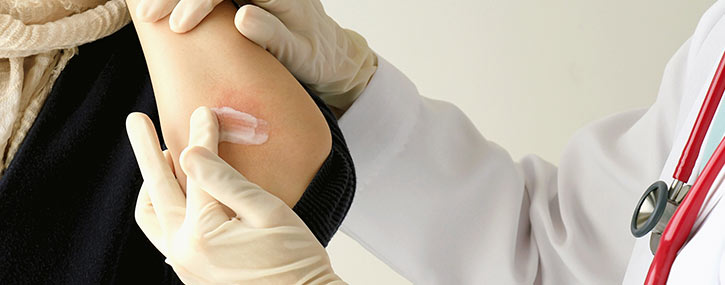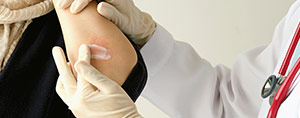Skin Rash: Types, Symptoms, Causes, Diagnosis & Treatment Q&A
Rashes can be caused by dermatitis, allergic eczema, psoriasis, chickenpox, insect bites, or other skin-related issues. Usually, rashes are non-threatening and can be easily treatable at home but if there are other symptoms such as blisters, open sores, fever, or serious itchiness or pain, you should consult a specialist such as Dr. Jon E. Stahlman, MD, at The Allergy & Asthma Center for comprehensive treatment. For more information, please contact us or book an appointment online. We serve patients from Lawrenceville, Atlanta, Conyers GA, and surrounding areas.




Table of Contents:
How do I identify the rash that I have?
What are the most common types of skin rashes?
What is the fastest way to get rid of a rash?
How do you know if a rash is serious?
Rashes are recognized as areas of irritated, inflamed skin, often with bumps and a scaly texture. They are known for causing symptoms like swelling, itchiness, and pain. The best way to identify the type of rash that you have is by consulting a medical professional capable of running the proper tests to find out the root cause. Without proper testing, it may be difficult to determine the type of rash you have because they are not always consistent in appearance. For example, some rashes will manifest as red splotches while others will be limited to blisters. The area of the body affected can also differ drastically from just a small, localized area to a rash across your entire body. These complications are what make identification difficult sometimes, especially without a proper diagnosis.
There is not one singular cause for rashes, but rather a large variety of conditions that may induce them. Some of the most common types of skin rashes include due to flea bites, ringworm, contact dermatitis, allergic eczema, psoriasis, and chickenpox, to name a few. There are many other causes that may be due to various viruses, bacteria, or allergens.
Young children and infants are at exceptionally high risk for developing rashes due to illness or other conditions. A few examples of these are fifth disease, impetigo, hand, foot, and mouth disease, Kawasaki disease, and diaper rash. Kids under the age of 5 are typically at much higher risk because they still lack a strong immune system.
The appearance and symptoms of the rash will also be determined, in part, by the type of rash. For example, someone with a rash due to flea bites can expect quick developing clusters of itchy red bumps, while someone with contact dermatitis can expect a delayed rash with scaly splotches of redness around the areas of contact. Rashes are used to describe a very broad range of complications which is why there seem to be so many types of rashes. Luckily, with the help of a qualified healthcare provider, you can effectively identify and find the right treatment plan for you.
There are many popular home remedies that you can utilize to aid in combating the symptoms of a rash. However, the most underutilized way is to not scratch the rash, because this will only worsen the rash. Nonetheless, these at-home solutions may help in getting rid of a non-chronic rash.
Applying cold water to the rash may help ease the feelings of itchiness. This is achieved either by soaking the area in a bath or pressing it with a cool, damp towel. Other substances like oatmeal, apple cider vinegar, coconut oil, and aloe vera may also help achieve relief with their soothing properties. The list of homemade aiding solutions is long, but even they can only do so much.
Aside from these, over the counter and prescription drugs may be suggested depending on the cause of your rash and may be the most effective way to get rid of it. However, many rashes will persist for a few weeks despite treatment, so time is also a requirement for the healing process.
Although most rashes are non-threatening and easily treatable from home, some rashes may be linked to dangerous illnesses or conditions. It is important to know the identifying factors of a rash that needs medical attention in case it should ever apply to you. If you have a widespread rash across your whole body, a rash that causes blisters or open sores, fever or sickness paired with a rash, a quick-spreading rash, a painful rash, or a rash affecting sensitive areas (eyes, lips, mouth, genitals), you should seek medical attention. If your symptoms do not match up with this description, but you are still worried about your rash, it is better to seek a doctor, especially if it causes you any discomfort or concern. For more information, please contact us or book an appointment online. We serve patients from Lawrenceville GA, Atlanta GA, Conyers GA, Suwanee GA, Duluth GA, Grayson GA, Decatur GA, Brookhaven GA, Lithonia GA and Covington GA.

Additional Allergy & Asthma Services
▸ Allergy Shots
▸ Allergy Testing
▸ Asthma
▸ Bronchodilators
▸ Drug Allergy
▸ Food Allergy
▸ Insect Allergy
▸ Nasal/Sinus Allergies
▸ Pediatric Allergy
▸ Pediatric Asthma
▸ Skin Allergy
▸ Spring Allergies




